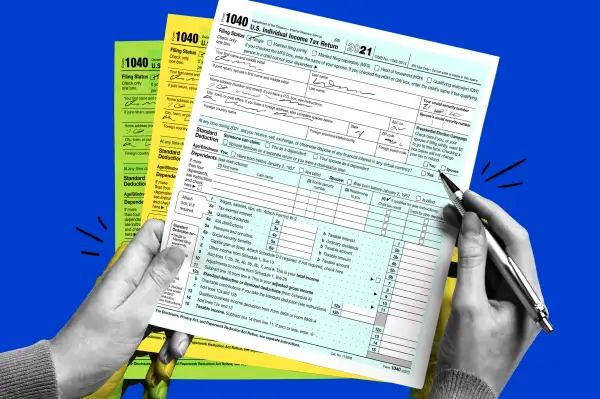7 Tax Changes That Could Affect Your Return — and the Size of Your Refund

The third COVID-19 tax season is underway, and — to make it even more fun — Americans have a bunch of IRS changes to contend with.
On top of the government agency's continued battle with its backlog of paperwork from prior years, the 2022 tax filing season is complicated by policies in the American Rescue Plan, signed into law by President Joe Biden last March.
The advance child tax credit payments, third stimulus check, charitable donations and more all may require special treatment on your 2021 tax return. And to get your refund as quickly as possible, it's also more important than ever to file your taxes accurately and electronically.
IRS tax changes
Most tax professionals and tax software programs will automatically incorporate the latest changes, but it's worth double-checking to make sure your preparer handles everything correctly.
Here are seven of the biggest tax changes that could affect your return this year:
1. The tax deadline has moved
The IRS pushed back the major tax filing deadlines in 2020 and 2021 in light of the pandemic, postponing the usual April 15 due date to July 15 and May 17, respectively. This year, we're back on track — kind of.
Taxes for most people are due April 18. The deadline got moved from April 15 because that falls on a holiday (Emancipation Day) in Washington, D.C. For taxpayers in Maine and Massachusetts, the deadline is April 19 due to another holiday (Patriots' Day).
Note that these deadlines only apply to federal, individual income taxes. The deadline for your state taxes may be different.
2. The IRS standard deduction increased
The IRS typically adjusts the standard deduction, a set amount by which people can reduce their taxable income, every year.
For the 2021 tax year, the standard deduction for single taxpayers is $12,550 — an increase of $150 from 2020. For married couples filing jointly, the standard deduction is $25,100; for heads of household, it's $18,800.
3. There's another stimulus check to deal with
The third Economic Impact Payment, or stimulus check, went out last spring (with plus-up payments distributed all year long). Legally, this stimulus check — like the previous two — was an advance payment on a fully refundable tax credit. Although the third stimulus check is not taxable income, it may still influence your 2021 taxes.
The IRS should have recently sent you a letter containing information about how much stimulus money you received. If you got the maximum amount of $1,400 per person, you don't need to worry about putting it on your return.
But if you didn't get the right amount, and you think you qualify for more money based on your family situation or income level, you'll need to claim the Recovery Rebate Credit. If you qualify, the IRS will either reduce your tax bill or increase your tax refund by the amount you're owed.
4. Families have to file to get more child tax credit money
The American Rescue Plan also significantly expanded the child tax credit, pumping up its maximum value and making it so families could receive advance payments for six months. But those payments only represented half of the child tax credit. To get the other half of the money, families have to file their taxes.
If you received advance CTC payments, the IRS should have mailed you Letter 6419 listing how many eligible children you have and how much money you got for them. Use this information to claim remaining child tax credit funds on your return.
If you opted out of the advance payments, you can claim the entire credit.
The earned income tax credit, or EITC, has changed, too. The age restrictions shifted, making Americans 19 years old and up with certain amounts of earned income (under $21,430 for single people; under $27,380 for joint filers) eligible for the credit. The maximum amount that workers without dependents can receive increased to $1,502.
Also, if it helps you qualify for more money, you can use your 2019 earned income to calculate your 2021 EITC.
6. Unemployment is taxable
The American Rescue Plan made it so certain taxpayers didn't have to pay taxes on up to $10,200 of their unemployment compensation in tax year 2020. But this isn't the case for 2021. If you received unemployment benefits last year, you have to report it on Schedule 1 Line 7.
7. You may qualify for a special charitable donation deduction
Since the passage of the 2017 Tax Cuts and Jobs Act, people generally have to itemize their taxes to claim charitable donations — meaning you're out of luck if you're part of the nearly 90% who take the standard deduction. But the Coronavirus Aid, Relief and Economic Security (CARES) Act, passed in 2020, introduced a special policy that allowed taxpayers to sidestep this rule and deduct up to $300 in donations even if they don't itemize. It was then extended through the end of 2021.
The limited-time-only tax benefit allows single filers to claim as much as $300 in cash contributions to certain charities during 2021. Married couples filing jointly can deduct $600.
More from Money:
Dollar Scholar Asks: What Do I Need to File Taxes?
Can You File Taxes for Free With TurboTax? It's Especially Complicated This Year
